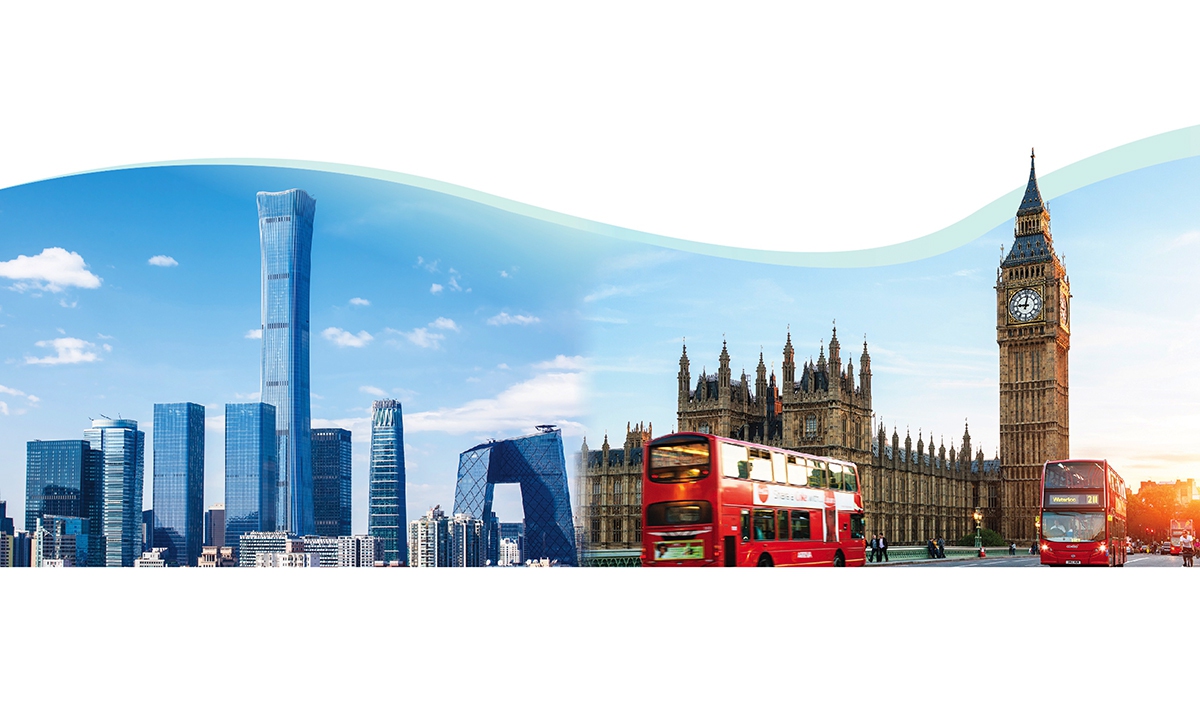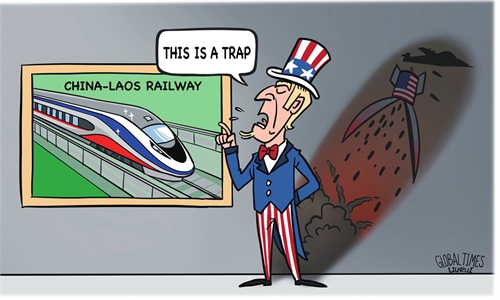
Photo: VCG
Editor's Note:
This year marks the 70th anniversary of the "Icebreaking Mission" of China-UK trade, which broke the ice in the West's trade with China in the 1950s. As some Western countries seek "de-risking" with China, their major trading partner, it becomes even clearer how precious the pioneering spirit of openness and cooperation is. In an interview with Global Times (GT) reporters Su Yaxuan and Li Aixin, Vice Chairman of the 48 Group Club Keith Bennett (Bennett) shared his views about UK-China relations and trade development.
GT: What do you think of the "ice-breaking spirit" in China-UK cooperation and how can it be continued?
Bennett: First of all, I think we have to be prepared to rise above the present difficulties, and we have to face them and confront them. In doing so, I think we need to continue to see the opportunities of the Chinese market and the great potential that the Chinese market still has.
China already has the largest middle-income group in the world, which is growing all the time. Most of the people in this group have a great thirst for high-quality brands and goods. And I think Britain is still seen by many people in China as being synonymous with quality in a number of key areas, like Burberry and Scotch whisky. On July 17, the Financial Times reported that Harrods, the most famous upmarket store in London, plans to open a very exclusive club in Shanghai.
Another area, I think, is renewable energy and new energy vehicles. We have examples where China is collaborating with Northern Ireland in the production of hydrogen buses. It's cooperating with battery storage at Minety, Wiltshire, in southwest UK, which is needed for renewable energy and wind and wave power.
There may be a very negative attitude in Westminster, but if you go out of the area, you'll find a lot more people are receptive to China. Late last year, the Chinese Chamber of Commerce in the UK issued its annual report, which showed a huge range of areas in which Chinese companies are operating in the UK. So what we see is that business doesn't want a Cold War with China, but engagement and mutual benefit.
GT: What role do you expect the 48 Group Club to play in future China-UK cooperation?
Bennett: The 48 Group Club has been playing its role in promoting cooperation between China and the UK for seven decades now. And earlier this month, Chinese President Xi Jinping himself sent a message of greetings and a very warm message for the 70th anniversary of the ice-breaking commission. Vice President Han Zheng participated in that event and read this message. So that's the sort of background and contemporary significance.
The 48 Group Club will continue working with the Chinese Chamber of Commerce in the UK. But within that, a major priority for us now is to try to help major companies with their long-term China strategy. The 48 Group Club has a long experience in China and a fairly deep understanding of China, and we want to contribute our insights to business and help them understand where China is going. For example, the targets for 2035 and 2049 in China synergize into their own China strategy in order to produce winning results.
GT: Why do you believe that China is an opportunity, not a risk? How will the US' "de-risking" approach affect the UK's relationship with China?
Bennett: I think that the term "de-risk" is actually a mistake and a meaningless term. It seems to have come about as an apparently nicer or lower-level way of talking about decoupling. They're just playing with words.
First of all, I think that decoupling with China is impossible. China is so deeply embedded in the global economy and global supply chains. I like to put a challenge to some people who say we shouldn't be trading with China. Ask them to try to take out of their homes everything that is made in China and everything where China plays a role in the supply chain production process. Then they will find their homes empty.
Some people want to say that China wishes to change our political or economic system in the UK or our way of life. But I think that China has no intention of doing that. I think China is not a risk, it's an opportunity. As far as I know, it's the only country that regularly holds expos and fairs to encourage other countries to export their products to China. That's a real open-door policy. We also see a lot of possibilities for cooperation and a lot of opportunities, for example, around the Greater Bay Area, where there can be a big role for UK banking and financial services.
De-risking from China is, to a great extent, driven by the most pro-US forces in the UK. That's undermining the idea of a Global Britain. But it is very difficult for Britain to demarcate itself from the US. And this is an important part of the difficulties that we in Britain are presently facing with China.
There are two important opportunities that we should seize. One is that we should work together to prevent a climate catastrophe. The other is that we should work together to promote development in Africa. Africa is the next continent in the world for growth and development. It's a continent with a young population and abundant resources with the possibility to leapfrog in its development.
GT: In such a politically charged atmosphere in the UK, is the 48 Group Club feeling the pressure? Are you hopeful for the resurgence of rational voices in the UK's approach to China?
Bennett: Let me start with a historical perspective on this. When the icebreakers set out for China 70 years ago, there was still a war on the Korean Peninsula. So at that time, the icebreakers faced huge pressure from the press and parliament. I mentioned that to say that for the 48 Group Club, a degree of pressure is nothing new to us. We've always lived with it at different times.
On the surface, the attack may appear to be on the 48 Group Club. But in reality, what's being attacked are all these people who stand for a positive and constructive relationship with China based on equality and mutual benefit.
I prefer to be realistic about the China-UK relationship. I think there are plenty of rational voices with regard to China relations in Britain, particularly among businesses, but these voices often do not receive the same level of attention as the negative ones. In the media, negativity makes for more sensational headlines than positive things.
But in politics at the moment, there is a kind of McCarthyism atmosphere with regard to China. And alongside that, there's the rising generation of politicians. And politicians in Britain tend to be very young these days, including leading politicians. I think there is quite a lack of knowledge about and expertise in China.
As I said, there are politicians who don't have negative attitudes toward China and see the possibility of having a better relationship. But because of McCarthyism, they're literally afraid to speak up. Nevertheless, I am sure that over time, the more rational people will increasingly find their voice. And I think that's because the crucial problems that are facing humanity can't be tackled without international cooperation. Problems like climate change, the pandemic, cybercrime, and terrorism can't just be solved behind national boundaries and walls. They rely on people working together. I think that for Britain's economic health, it can't afford to lose the opportunities that China presents.
GT: How do you view the China-proposed Belt and Road Initiative (BRI)? Over the past 10 years, what opportunities has the BRI brought to the world economy and China-UK economic development?
Bennett: I see it as a very visionary concept. It's a concept for a whole historical period. I think that infrastructure and connectivity are the keys to development, and they're the keys to poverty alleviation. I think this is why the majority of countries in the world, in one way or another, have embraced the concept of the BRI and signed up for it. It encompasses the whole globe.
When the China-UK relationship was more positive, they also tried to do that with the two policies that were being put forward in the UK. Unfortunately, in the present atmosphere, that level of cooperation appears to have stalled.
A great opportunity for the UK with regard to BRI is to work with China in third world countries, for example, Kazakhstan. It's one of the two places where the BRI was first put forward. It's China's neighbor, with great development potential. And it's very rich in energy resources, including oil and gas, and Britain has a significant interest in that. So there's a whole possibility to work with China in Kazakhstan on regional issues, like creating a regional financial center to have listings in a standard, and so on.
The other area is Africa; as I said, Africa is the next continent of growth, development, and opportunity. In history, the relationship between the UK and Africa has not always been happy, but we still have approximately half of the countries in Africa that have English as their first language. They are members of the Commonwealth. We have deep ties with them. There is a big African community in the UK, and we have expertise and knowledge with regard to Africa.
And I think with Shenzhen, we have the possibility for the Greater Bay Area. Former British prime minister Tony Blair said that he had the idea that Hong Kong would function as a bridge rather than a barrier between Britain and China. And I think we need to get back to these visions.

